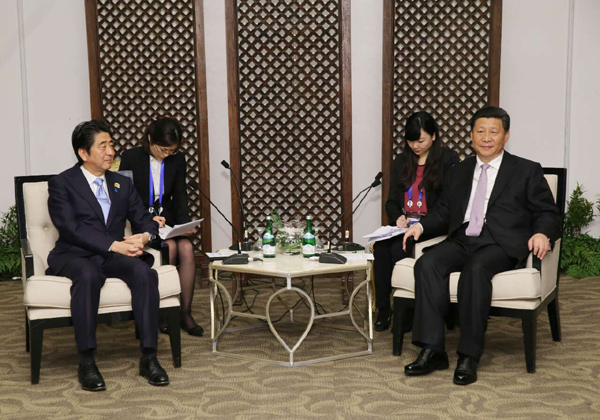Onus on US to bridge China-Japan divide
- By Shen Dingli
 0 Comment(s)
0 Comment(s) Print
Print E-mail China Daily, August 28, 2015
E-mail China Daily, August 28, 2015
|
|
|
Chinese President Xi Jinping (R) and Japanese Prime Minister Shinzo Abe hold a meeting at the request of the Japanese side in Jakarta, Indonesia, April 22, 2015.[Photo/Xinhua] |
With China preparing to mark the 70th anniversary of the end of World War II, it is time to reflect on the past and take measures to fortify a peaceful future. The anniversary is especially important for China because it not only bore the brunt of Japanese aggression before and during WWII, but also played a key role in Japan's defeat.
Thanks to the lessons of WWII, the international community has succeeded in avoiding another world war despite regional conflicts and tensions, with the United Nations and its principle of non-aggression and coordination among major powers laying the foundation for world peace.
The United States' role both during and after WWII has been unique. During WWII (in 1941 to be precise), the US forged a strategic partnership with China and the two countries jointly fought against Japan. After Japan's surrender in WWII, the US made the country adopt a pacifist Constitution, which stipulated Japan should not have a full-fledged military and could take defensive action within its territory only. According to the Constitution, therefore, Japan is not entitled to "collective self-defense" despite its alliance with the US.
Over time, the US has turned its former enemy into an ally. Although such reconciliation is welcome and it is commendable that Washington and Tokyo have been able to heal their wounds, it seems the US made Japan an ally primarily for geostrategic purposes during the Cold War - to use Japan for regional and global dominance. Consequently, the US has ignored not only the spread of rightwing ideologies in Japan but also its leaders' refusal to express remorse for the country's war past. In fact, the US has rewarded Japan for its actions and inactions both, by "handing over" the Diaoyu Islands to it in 1972 and by defending Japan's "sovereignty" over them.






